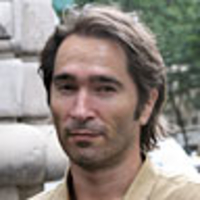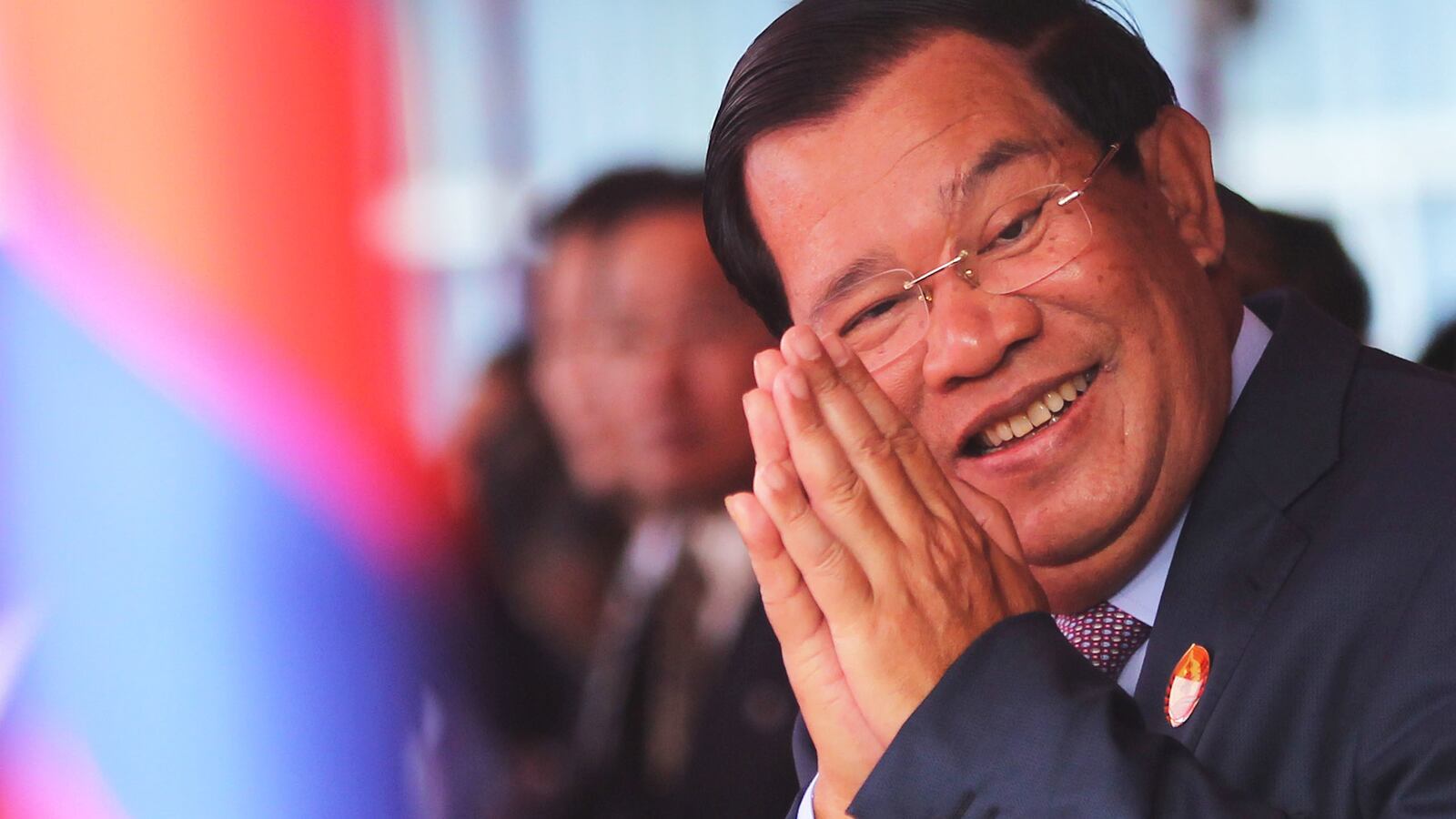Donald Trump has a lot to answer for in Cambodia, a country he rarely thinks about, if ever. But the hard-edged government of Hun Sen knows a green light for oppression when it sees one, and it’s now engaged in a multi-pronged crackdown on the free press and the political opposition.
In the last few weeks, authorities in Phnom Penh have shuttered the U.S. State Department-funded National Democratic Institute, triggered the closure of the highly respected and non-partisan English-language Cambodia Daily (where I worked early in my career), and ordered the silencing of nearly 20 radio stations unless they stopped broadcasting programming critical of the government.
Without such media, far fewer Cambodians will be able to access critical or objective journalism in the run-up to the July 2018 parliamentary elections, making the possibility of free and fair voting increasingly elusive. That is part of reason the Daily’s final issue focused on its persecution by tax authorities and an effort to decapitate the political opposition under the cover headline: “Descent into Outright Dictatorship.”
Government spokesmen in Phnom Penh repeatedly cite U.S. President Trump’s criticism of U.S. media, as well as the move to exclude some from the White House, as a justification for clamping down on media messengers in Cambodia.
And, after a CNN report cited a nonprofit group that worked against sex trafficking in Cambodia, in early August the government ordered the organization to be shut down for allegedly exaggerating the problem.
Speaking of “an insult which can’t be tolerated,” Hun Sen went full-Trump. “CNN deserves the rantings of President Donald Trump,” he said at a graduation ceremony for law students. “His rantings are right. I would like to send a message to the president that your attack on CNN is right. American media is very bad.”
Cambodia, in fact, has plenty of “American” media. The government-ordered radio closures have mostly hit stations that broadcast U.S.-funded programming like Radio Free Asia and Voice of America, both of which are based in Washington, D.C.
And then there is—was—The Cambodia Daily, whose final issue detailed the story behind a seemingly arbitrary $6.3 million tax bill they were given just one month to pay. Both founder Bernard Krisher, and his daughter Deborah, who bought the paper in the spring for a symbolic sum, are American.
Prominent exiled opposition figure Sam Rainsy said in a phone interview with The Daily Beast that President Trump’s tone, priorities, actions, and inaction are facilitating a “striking authoritarian drift” in Cambodia and elsewhere.
“Dictators around the world feel encouraged,” Rainsy said from Paris.
“Hun Sen is benefitting from the eclipse of America, the loss of influence of the U.S. under Donald Trump; its lack of interest in human rights in far-away countries,” he said.
The implications are direct for Rainsy, who spent more than two decades building up a popular opposition movement in his homeland under the decreasingly watchful eye of the United States and an international community whose priorities often seem to be shifting elsewhere. Little changed in Cambodia when Rainsy faced politically motivated charges of defamation that risked sending him to prison for two years.
And when the ruling party passed a law allowing the government to shut down any political party whose leader has been convicted of a crime, Rainsy decided to give up the leadership of the Cambodian National Rescue Party early this year to save the opposition movement and allow it to run in local elections in June.
That led Kem Sokha, another longtime political opponent of Hun Sen, to take the reins of the party, and lead it to a surprisingly strong showing in local elections in June—setting the stage for what many observers expected to be a hard-fought national election next summer.
Rainsy, meanwhile, is stuck overseas, banned from returning to Cambodia, with authorities warning airlines against flying him into the country on a commercial flight because it could lead to bloodshed.
Such threats carry great weight in Cambodia, especially when they emanate from Hun Sen’s inner circle, but also because of the many skeletons in the country’s history. Once Southeast Asia’s oasis of peace, President Richard Nixon and Secretary of State Henry Kissinger launched a secret (and illegal) bombing campaign in Cambodia in the late 1960s to stop Vietnamese fighters from escaping carpet-bombing on their own soil by fleeing to a safe haven in Cambodia.
And so began the destabilization that helped facilitate the rise of the Khmer Rouge, an ultra-radical Maoist group with a particularly strong nationalist streak and a growing hatred of its former patron, Vietnam.
As the U.S. abandoned a failing war in Southeast Asia in 1975, the Khmer Rouge seized power in Cambodia. Their leadership—simultaneously incompetent, cruel, and stunningly paranoid—engaged what has become known as the Khmer Rouge genocide in which 1.8 million Cambodians died of starvation, disease, and executions in less than four years.
Hun Sen was one of the Khmer Rouge’s young commanders—at least until a wave of internal purges convinced him to flee to neighboring Vietnam where the government developed an appreciation for him. After Hanoi’s leadership overthrew the Khmer Rouge in 1979, they eventually installed Hun Sen as Cambodia’s minister of Foreign Affairs at a time when all major decisions emanated from Hanoi. In 1987, as the Vietnam occupation ended, Hun Sen became prime minister of a shaken country that remained reliant on its neighbor to the east.
And there Hun Sen has stayed, even as efforts to bring an end to decades of strife and confrontation resulted in a sprawling United Nations-driven peace process that began in 1991. Vietnam, the U.S., France, and other relevant foreign powers committed to the process.
What followed was a massive and costly international nation-building effort. Billions of dollars in aid were pumped into one of the poorest, most troubled countries in the world—on the condition that it become a multi-party democracy with a functioning state of law. In those circumstances, a free press was crucial. One of the main international guarantors of that whole process has long been the United States both despite and because of its complicated history in the region.
In the 32 years since he first became prime minister, Hun Sen, now 65, has learned to cater when necessary to the language of pluralistic democracy, although his autocratic tendencies have surfaced repeatedly, especially in the run-up to elections. But over the years a strong international reaction, especially when the U.S. enforced economic consequences, has convinced him repeatedly to back down, or at least to tone down.
In the Trump era, however, there are growing indications that Hun Sen feels he can be what he always wanted to be: a despot.
The official justifications for the government offensive on media and nonprofits was bureaucratic. Cambodia’s Department of Taxation and Ministry of Information went after them for supposed tax-, contract- and permit-violations.
But Hun Sen himself triggered that process when in early August he asked his cabinet to investigate the tax status of media companies and nonprofit entities that he has roundly attacked in the past.
And the pseudo-bureaucratic justifications for those closures were stripped away just after midnight on Sept. 3 when a far larger repressive strategy kicked in. More than 100 well-armed police swarmed the home of opposition leader Sokha and took him away, dazed, in handcuffs.
Hun Sen’s pliant courts have charged Sokha with treason and conspiring with a foreign country, the United States. Hun Sen explained that Sokha’s actions were so serious that he had to take action. But the evidence so far presented against the opposition leader, according to media close to the government, are based on an edited 2014 video of a speech Sokha made in Australia. In that talk, Sokha said that experts in various parts of the world, including American academia, were advising him, and he suggested that he was learning how to lead a peaceful people power revolution of the sort that Hun Sen is obsessed with preventing.
Due to the gravity of the charges brought against him Sokha could face 15 to 30 years in prison.
Hun Sen has long used his control of all major government, judicial, and military institutions to divide his opponents before elections, whether through tempting job offers, payoffs, threats, criminal charges, or more extreme measures.
But the breadth of this pre-election mobilization stands out. Hun Sen is suggesting that other opposition figures may face prosecution, and if an opposition party tries to protect its leader, he has said, it will be eliminated.
Beyond the campaign calendar, why is this crackdown so much broader and more blatant than those that came before it?
“It is a new world with Donald Trump,” explained Rainsy, who from exile is hoping to convince the international community, especially European nations, to mobilize renewed pressure to free Sokha, save the opposition party, and get Cambodia back toward the democratic path.
“The U.S. is very weak,” says Rainsy, and that is a big problem for countries like Cambodia. “Before the United States acted as a brake for dictators, but the U.S. is no longer playing its role.”
Even before Sokha’s arrest, the United Nations Human Rights chief, Prince Zeid bin Ra’ad, was highlighting the link between Trump’s repeated attacks against some of the U.S.’ most prestigious media, like The New York Times and The Washington Post and events in Cambodia.
“The demonization of the press [in the U.S.] is poisonous because it has consequences elsewhere,” Ra’ad said in comments at an Aug. 30 news conference in Geneva. He also spoke of the danger that Trump’s comments could incite violence against journalists—and not just in United States.
During Hun Sen’s years in power, countless journalists have been threatened with prosecution by the courts, not to mention anonymous and not-so-anonymous death threats. A dozen journalists are known to have been murdered, according to the Committee to Protect Journalists.
The idea that a president of the United States would actively speak against the freedom of the press, a cornerstone of the U.S. Constitution and something American presidents have promoted for generations amounts to “a stunning turnaround,” Ra’ad noted.
Hun Sen hoped for a such a turnaround when, in the run-up to Trump’s 2016 election victory, he called the American businessman “very talented” and said, “I really want him to win.” The Cambodian strongman foresaw better relations between the U.S. and Russia, Cambodia’s former patron state, and less American pressure over human rights abroad.
He may not have foreseen the massive decrease in U.S. aid that Trump has ordered, however. The U.S. plans to reduce assistance to Cambodia from $78.3 million this year to just $21.5 million next year. Or perhaps Hun Sen just figured a decline in conditional aid and investment from Western countries is being more than replaced by the rising influence of China in the region. Beijing doesn’t care about the free press or respect for multi-party democracy, and with Hun Sen repeatedly sticking his finger in the eye of the U.S. in Southeast Asia, China keeps rewarding him with ever-growing foreign investment.
So Hun Sen is surfing the rise of China, and the declining interest of the U.S., regardless of its past commitments. “Hun Sen knows he can do what he wants,” Rainsy said. “Donald Trump doesn’t care about countries like Cambodia.”





